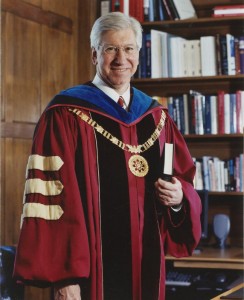(May 17, 1942 – Sept. 16, 2009). Born in Brooklyn, New York, Myles Brand was the son of Irving and Shirley Berger Brand. Neither of his parents attained a college education, but, after noticing Brand’s early talent for math and science, they encouraged him to pursue higher education.
Brand attended Rensselaer Polytechnic Institute, the oldest U.S. technological research university located in Troy, New York, as a mechanical engineering major due to its practicality. After one year, he shifted to philosophy with the help and guidance of his mentor Robert Whalen. Brand earned a B.S. in philosophy in 1964 and a Ph.D. in philosophy in 1967. His dissertation examined action theory, which analytically examines intentions and motivations—a concept that would shape his career.
Brand served as chair of the Department of Philosophy at the University of Illinois at Chicago from 1972 to 1980. In 1981, he moved to the University of Arizona, where he held several positions between 1981 and 1986: head of the Department of Philosophy, director of the cognitive science program, dean of the faculty of social and behavioral sciences, and coordinating dean of the College of Arts and Sciences. In 1986, Brand accepted the position of provost and vice president for academic affairs at Ohio State University (1986–1989). He served as president of the University of Oregon (1989–1994) during a difficult budgetary crisis, and in 1994 became the 16th president of Indiana University (1994–2002).
As president of Indiana University, Brand oversaw the consolidation of the hospitals and to form Clarian Health Partners (now IU Health). He also initiated a major marketing plan to increase awareness of programs at Indiana University (IU) and established the university as a national leader in information technology.
In 2000, Brand made the controversial decision to fire 20-year veteran men’s basketball coach Bob Knight after students and staff accused him of a pattern of verbal and physical abuse. Knight violated the probationary sanctions he agreed to follow, which compelled Brand to relieve him of his duties.
One of his most notable and nationally acclaimed speeches was to the National Press Club in 2001, entitled, “Academics First: Reforming Intercollegiate Athletics.” He underscored the need for the academic community to acknowledge and address the existing disparities between intercollegiate athletics and the true mission of higher education.
With the retirement of (NCAA) president Cedric Dempsey in 2002, the NCAA Executive Committee searched for a new president who would refocus the organization to protect the well-being and interests of student-athletes. On January 1, 2003, the committee unanimously selected Myles Brand, the first college president to serve as its chief executive, on faith that he would prioritize the academic success of student-athletes. Indeed, Brand developed a plan to emphasize a balance between academics and athletics.
Not only did Brand work to reform collegiate sports by prioritizing academics, he also advocated for equity in athletics by addressing issues of injustice regarding race, gender, sexuality, and disability. Brand’s reform-and-advocacy approach to his work stemmed from his philosophical perspective. His special interest lay in action theory, defining an agent’s action by analyzing its parts of intentions and plans. For Brand, the best way to achieve action or change came through administrative positions that afforded opportunities to accomplish that change. His method is apparent through his creation of the NCAA’s Office for Diversity and Inclusion, which implemented programs such as the Diversity Education Program, the Football Coaches Academy, and the Leadership Institute for Ethnic Minority Males and Females in 2005. In 2009, Brand’s academic reform initiative reached its initial goal of an 80 percent Division 1 graduation rate for student-athletes. That number rose to 90 percent in 2020.
Brand retired as president of the NCAA in 2009 after a diagnosis of Stage IV pancreatic cancer. In 2019, Indiana University renamed the informatics building on its Bloomington campus Myles Brand Hall in his honor.
Oral history clips courtesy of the Tobias Leadership Center at Indiana University.

Help improve this entry
Contribute information, offer corrections, suggest images.
You can also recommend new entries related to this topic.





